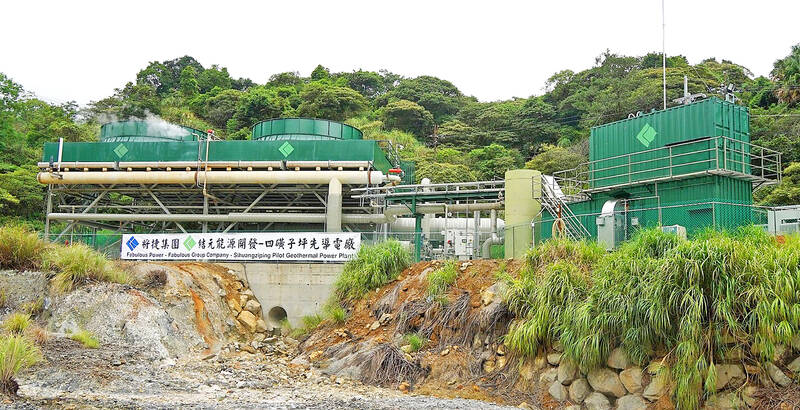Taiwan is preparing to launch commercial operation of its first geothermal power plant that draws energy from a volcano, with the capacity to provide electricity to about 1,500 households in New Taipei City, New Taipei City Deputy Mayor Liu Ho-jan (劉和然) said on Tuesday.
The Sihuangziping Pilot Geothermal Power Plant (四磺子坪先導地熱發電廠) in the city’s Jinshan District (金山) has been connected to the electricity grid, drawing on the Datun Volcanic Group (大屯山火山群) to power its 1 megawatt (MW) generator, Liu was cited as saying in a city government news release after he visited the plant.
The launch of commercial operations later this month would be a milestone in Taiwan’s renewable energy efforts, as it would be the first plant powered by volcanic energy, he said, without giving a specific opening date.

Photo: Lu Hsien-hsiu, Taipei Times
Currently, the Sihuangziping plant can generate enough power to supply 1,500 four-person households for a year, according to the city government, which listed its annual power generation at 6.4 gigawatt-hours.
While Taiwan’s renewable energy efforts so far have been focused mainly on wind and solar energy, geothermal power is also being researched and developed, Liu said.
It is a stable and good base-load power source, with the capacity to remain in operation around the clock, 365 days a year, he said.
There is a high-temperature geothermal reservoir under the Datun Volcanic Group, which accounts for 70 percent of the country’s shallow geothermal energy resources, Liu said.
At the end of the year, construction would begin on a second geothermal plant powered by the volcanoes in the cluster, and it is expected to have a capacity of 4MW, with an annual generation of 27 gigawatt-hours, the New Taipei City Government said.
New Taipei City Economic Development Department head Ho Yi-ming (何怡明) said that geothermal investigation of the Datun Volcanic Group began as far back as 1966, but the fluid was too acidic, a problem that could not be solved with the technology at the time.
Fabulous Power Co, which was contracted to develop geothermal energy in the country, has since introduced the latest global technologies, including the use of dry-steam power generating sets and other techniques to deal with the acidity problem, Ho said.
Taiwan has four types of geothermal energy: magmatic-volcanic, extensional domain, orogenic belt/foreland basin, and geo-pressured geothermal, according to an article by National Taiwan University geology professor Song Sheng-rong (宋聖榮) published in a science education periodical in 2021.
The geothermal energy of magmatic volcanoes comes from the magma in shallow subsurface areas, while that from extensional domain volcanoes comes from temperature differentials caused by the rapid extension of the continental crust. The energy source of orogenic belt/foreland basin type volcanoes comes from the rapid uplift of the crust in the mountain-building process, and the geothermal source of geo-pressured geothermal systems comes from either the heat, mechanical energy, or methane dissolved in brine from the stratum, Song wrote.
Extensional domain energy is being generated at the Cingshuei Geothermal Power Plant in Yilan County, which has a capacity of 4.2MW, while an orogenic belt/foreland basin geothermal plant with a capacity of 0.5MW began commercial operations in Jinlun (金崙) in Taitung County’s Taimali Township (太麻里) in April.

Chinese Nationalist Party (KMT) Chairman Eric Chu (朱立倫), spokeswoman Yang Chih-yu (楊智伃) and Legislator Hsieh Lung-chieh (謝龍介) would be summoned by police for questioning for leading an illegal assembly on Thursday evening last week, Minister of the Interior Liu Shyh-fang (劉世芳) said today. The three KMT officials led an assembly outside the Taipei City Prosecutors’ Office, a restricted area where public assembly is not allowed, protesting the questioning of several KMT staff and searches of KMT headquarters and offices in a recall petition forgery case. Chu, Yang and Hsieh are all suspected of contravening the Assembly and Parade Act (集會遊行法) by holding

PRAISE: Japanese visitor Takashi Kubota said the Taiwanese temple architecture images showcased in the AI Art Gallery were the most impressive displays he saw Taiwan does not have an official pavilion at the World Expo in Osaka, Japan, because of its diplomatic predicament, but the government-backed Tech World pavilion is drawing interest with its unique recreations of works by Taiwanese artists. The pavilion features an artificial intelligence (AI)-based art gallery showcasing works of famous Taiwanese artists from the Japanese colonial period using innovative technologies. Among its main simulated displays are Eastern gouache paintings by Chen Chin (陳進), Lin Yu-shan (林玉山) and Kuo Hsueh-hu (郭雪湖), who were the three young Taiwanese painters selected for the East Asian Painting exhibition in 1927. Gouache is a water-based

Taiwan would welcome the return of Honduras as a diplomatic ally if its next president decides to make such a move, Minister of Foreign Affairs Lin Chia-lung (林佳龍) said yesterday. “Of course, we would welcome Honduras if they want to restore diplomatic ties with Taiwan after their elections,” Lin said at a meeting of the legislature’s Foreign Affairs and National Defense Committee, when asked to comment on statements made by two of the three Honduran presidential candidates during the presidential campaign in the Central American country. Taiwan is paying close attention to the region as a whole in the wake of a

OFF-TARGET: More than 30,000 participants were expected to take part in the Games next month, but only 6,550 foreign and 19,400 Taiwanese athletes have registered Taipei city councilors yesterday blasted the organizers of next month’s World Masters Games over sudden timetable and venue changes, which they said have caused thousands of participants to back out of the international sporting event, among other organizational issues. They also cited visa delays and political interference by China as reasons many foreign athletes are requesting refunds for the event, to be held from May 17 to 30. Jointly organized by the Taipei and New Taipei City governments, the games have been rocked by numerous controversies since preparations began in 2020. Taipei City Councilor Lin Yen-feng (林延鳳) said yesterday that new measures by